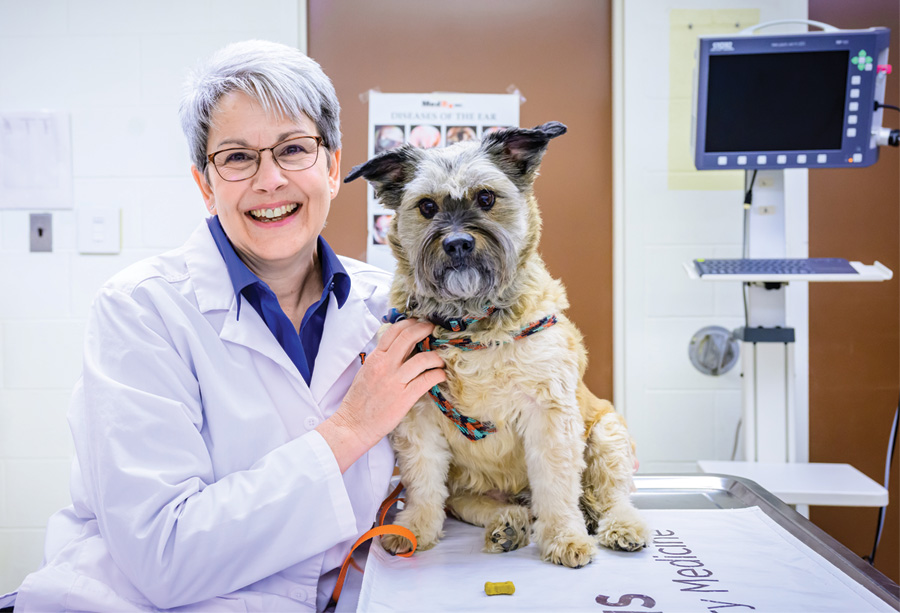Biomarkers Aid Diagnosis of Cardiac Conditions
Cardiac biomarkers are substances that are released into the blood when the heart is damaged or stressed. Measurements of these biomarkers are used to help support the diagnosis of a variety of conditions, including heart failure, myocarditis, and cardiomyopathies. The most widely utilized cardiac biomarkers in dogs and cats are B-type natriuretic peptide (BNP) and cardiac troponin I (cTnI).

In the future, there may be cardiac biomarkers that provide valuable prognostic information. At the University of Illinois College of Veterinary Medicine, we are currently evaluating galectin-3 (Gal-3) and ST2 for their potential value in providing prognostic information (Figure 1).
Current Biomarkers: BNP
BNP is a hormone produced by the myocardium that causes renal sodium and water loss, as well as vasodilation. BNP is produced and secreted into the blood by the muscle cells of the heart. Low concentrations of BNP circulate at all times, but the heart increases production and secretion in response to excessive stretching of heart muscle cells.
Excessive stretching of heart muscle cells is common in many forms of heart disease and in the setting of heart failure. The magnitude of the increase in circulating BNP is correlated to the severity of the underlying heart disease. BNP pro-hormone is secreted into the circulation during periods of cardiac stress and is cleaved into the carboxyterminus (C-BNP) and the amino-terminus (NT-proBNP); thus, the concentration of either can be used to assess the magnitude of cardiac muscle stretching and commensurate increased wall stress.
A commercial assay for feline and canine NT-proBNP (Cardiopet® proBNP) has been available for more than five years and many clinical studies have been published that support its clinical utility. Recently, a qualitative cage-side ELISA (SNAP® Feline proBNP) was introduced, which allows for rapid determination of feline NT-proBNP concentration. Table 1 summarizes the common clinical uses of NTproBNP in dogs and cats.

Current Biomarkers: cTnI
Cardiac troponin I (cTnI) is a cardiac-specific protein involved in cardiomyocyte contraction and relaxation. cTnI is also present in skeletal muscles; however, the cardiac-specific isoform has a different amino acid sequence and does not cross-react with any of the commercially available assays.
Circulating cTnI concentration has been used for the detection of both acute and chronic myocardial damage in dogs, cats, and horses and has been shown to increase in proportion to the degree of myocardial damage or severity of underlying cardiac disease.
Recently cTnI has been shown to be increased in dogs and cats with cardiomyopathies, and this biomarker may have some value as a screening test for hypertrophic cardiomyopathy (HCM) in cats. Dogs and cats have very low levels of circulating cTnI. The normal reference range for dogs is < 0.15 ng/mL and for cats is < 0.06 ng/mL.
Future Cardiac Biomarkers
NTproBNP and cTnI have been found to be useful at identifying patients who should undergo further cardiac evaluation. They can also be helpful in assessing myocardial damage. However, they have not been found to be reliable, independent predictors of adverse cardiac outcomes in dogs or cats with heart disease.

The clinical cardiology service at the University of Illinois is currently exploring new biomarkers that may provide significant prognostic information for dogs and cats with heart disease: galectin-3 (Gal-3) and ST2. Experimental studies support the involvement of Gal-3 in the onset and progression of fibrotic disorders. Gal-3 may also play a role in the promotion of myocardial remodeling and heart failure pathophysiology. ST2 is a member of the interleukin-1 receptor family. Stimulation of ST2 is similar to the mechanical strain induction of natriuretic peptides, which is a useful diagnostic and prognostic marker in human heart failure. An excess of ST2 leads to cardiac fibrosis and ventricular dysfunction.
Both ST2 and Gal-3 have been shown to be strong predictors of mortality and adverse outcomes in people with heart disease. Through ongoing research, we hope to determine whether Gal-3 and ST2 can provide the same level of prognostic information in veterinary patients.
Illinois Cardiology Service
The cardiology service at the University of Illinois College of Veterinary Medicine is comprised of two board-certified cardiologists (Drs. Ryan Fries and Jordan Vitt), three cardiology residents (Drs. Saki Kadotani, Jon Stack, and Gabrielle Wallace), and two full-time technicians (Katie McConnell and Candice Simpson).
If you have questions about cardiac biomarkers or any heart-related questions, please do not hesitate to contact our service for more information.
217-300-1643; vthcardiology@vetmed.illinois.edu
By Ryan Fries, DVM, DACVIM (Cardiology)
The cardiology team members in the photo at top are (from left) Dr. Jordan Vitt, Dr. Jon Stack, Candice Simpson, CVT, Dr. Ryan Fries, Dr. Saki Kadotani, and Katie McConnell, CVT.



